Welcome To Our Irrigation Library!
Explore Irrigation System Management
Traditional Irrigation controllers
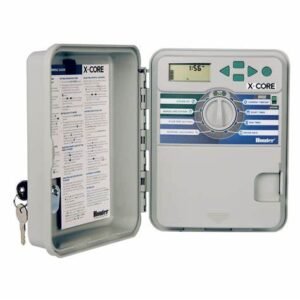
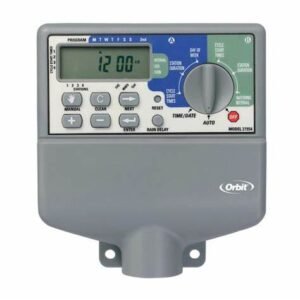
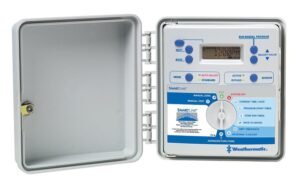
For those who prefer a more straightforward approach or aren’t tech-savvy, irrigation controllers can function as traditional units. Running the preset program from the predefined start time till the set run time is expired on each zone. Let us to introduce the irrigation system management in essence: this is pretty straightforward. You can learn about programs and zones here.
Inlfuencing The Irrigation System Management By Sensing The Weather
Traditional sensors
To enhance the functionality of irrigation system management with a touch of intelligence, an array of advanced sensors such as rain sensors, freeze sensors, moisture sensors, and wind sensors can be seamlessly integrated and interlinked with the main controller. This ingenious implementation allows the system to intelligently respond and adapt to the ever-changing weather conditions.
The inclusion of rain sensors empowers the system to detect and promptly respond to the onset of rainfall. These sensors accurately gauge the precipitation levels, enabling the controller to halt the irrigation system when rain is detected. This ensures that water is conserved and prevents overwatering, saving both resources and money.
Furthermore, freeze sensors play a vital role in safeguarding the irrigation system during cold weather conditions. By continuously monitoring the temperature, these sensors can detect freezing temperatures and promptly alert the controller. Subsequently, the system can be halted to prevent water from freezing within the pipes and causing damage.
Moisture sensors, on the other hand, provide valuable insights into the soil’s moisture levels. By constantly measuring the moisture content in the soil, these sensors enable the controller to make informed decisions regarding irrigation scheduling. When the moisture levels are within the desired range, the system can be halted to avoid unnecessary watering, thus promoting efficient water usage.
In addition to these sensors, wind sensors prove to be indispensable in maintaining an optimal irrigation process. These sensors accurately measure wind speed and direction, enabling the controller to intelligently respond to windy conditions. By halting the system during high wind situations, the risk of water wastage due to evaporation or uneven distribution is significantly reduced.
Through the seamless integration of these intelligent sensors with the central irrigation system management , the irrigation system can dynamically adapt to various weather conditions. This intelligent response not only ensures efficient water usage but also extends the longevity of the system by preventing potential damages caused by adverse weather.
In conclusion, the incorporation of rain, freeze, moisture, and wind sensors into the irrigation system management adds a touch of intelligence. This allows the system to respond promptly and adaptively to changing weather conditions, resulting in optimal water usage, cost savings, and enhanced longevity.
Smart Sensors – Smart controllers
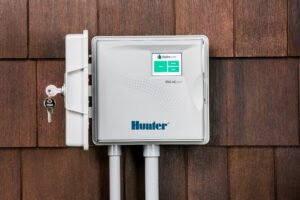
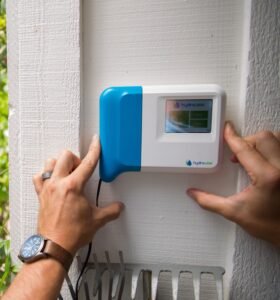
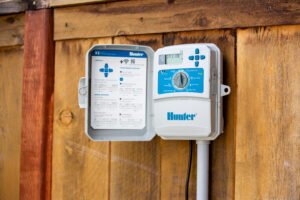
Most mains-powered controllers come with a built-in or adaptable Wi-Fi module for a reason.
A Wi-Fi-enabled controller not only provides the convenience of program setup through a mobile phone but also offers a plethora of advanced features. However, the true advantage of this irrigation system management lies in its ability to harness the power of historical and forecasted local weather information. By utilizing this data, the controller can automatically adjust the start and running times of your irrigation system, making it highly flexible and efficient.
The incorporation of historical weather data allows the controller to analyze past weather patterns, taking into account factors such as rainfall, temperature, and humidity. This analysis provides valuable insights into the specific needs of your landscape, enabling the system to adapt accordingly. Moreover, by considering forecasted weather information, the controller can anticipate upcoming weather conditions, ensuring that your irrigation schedule aligns with the needs of your plants and soil.
The automatic adjustments made by the irrigation system management based on weather data result in significant water savings. Compared to traditional irrigation methods that often rely on fixed schedules, this advanced system optimizes water usage by irrigating only when necessary. By avoiding unnecessary watering during periods of rainfall or high humidity, the controller minimizes water wastage and helps conserve this precious resource.
The potential water savings achieved by using a Wi-Fi-enabled controller are nothing short of impressive. Studies have shown that this technology can save up to 50% more water compared to traditional irrigation methods. This substantial reduction in water consumption not only benefits the environment but also leads to considerable cost savings for homeowners and businesses alike.
In addition to water conservation, the efficiency of the system contributes to healthier and vibrant landscapes. By providing the right amount of water at the right time, the Wi-Fi-enabled controller ensures optimal plant growth and reduces the risk of over or under-watering. This, in turn, promotes healthier roots, reduces plant stress, and enhances the overall beauty of your landscape.
Overall, a Wi-Fi-enabled controller revolutionizes irrigation practices by combining the convenience of mobile programming with the invaluable use of historical and forecasted weather data. Its ability to automatically adjust irrigation schedules based on this information not only makes your system highly adaptable but also significantly reduces water usage. With the potential to save up to 50% more water compared to traditional methods, this advanced technology paves the way towards a more sustainable and efficient approach to irrigation.
Enter the cutting edge of the irrigation industry – smart flow meters. When connected to the controller, these meters provide real-time insights into system malfunctions, leaks, shortages, and even internet disruptions. Detailed reports on running durations, local sensor statuses, water usage, and amended programs are at your fingertips. It’s a game-changer for those seeking a comprehensive overview of their irrigation system.
Battery controllers
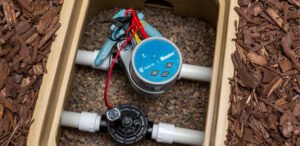
In situations where a mains socket is unavailable or impractical to extend, battery controllers step in. Ideal for smaller systems, these controllers, though more traditional, lack internet connectivity. However, they can be programmed via Bluetooth connection with a mobile phone, offering a practical solution for less complex setups.
Video help
Watch the setup process of our most commonly installed controllers

